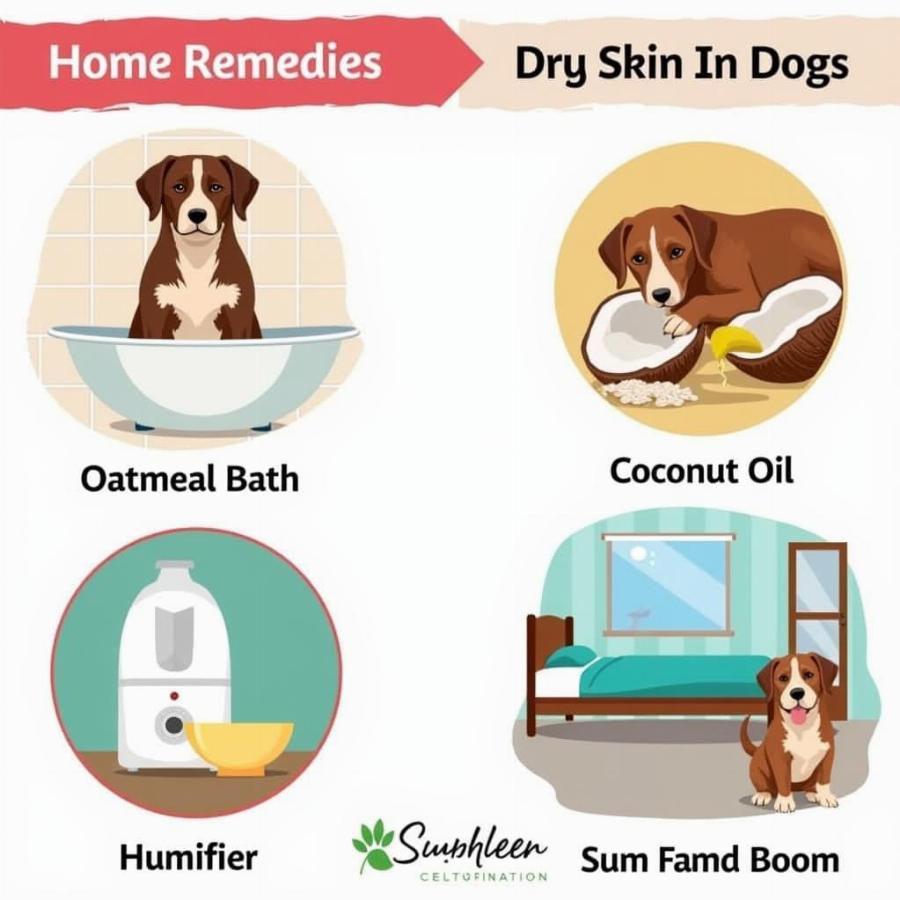Dry skin in dogs, also known as xerosis, is a common issue that can cause discomfort and itching. Addressing dry skin effectively requires understanding the underlying causes and implementing the right treatment strategies. This comprehensive guide delves into the various aspects of dry skin in dogs treatment, providing you with the knowledge and tools to help your furry friend regain their healthy, vibrant coat.
Understanding the Causes of Dry Skin in Dogs
Several factors can contribute to dry skin in dogs, from environmental conditions to underlying health issues. Identifying the root cause is crucial for effective dry skin dogs treatment. Common culprits include:
- Allergies: Environmental allergens like pollen, dust mites, and certain foods can trigger allergic reactions, leading to itchy, dry skin.
- Nutritional Deficiencies: A lack of essential fatty acids, particularly omega-3 and omega-6, can compromise skin health and contribute to dryness.
- Parasites: Fleas, ticks, and mites can irritate the skin, causing excessive scratching and dryness.
- Climate: Dry air, especially during winter months, can strip the skin of its natural moisture. Similarly, excessive sun exposure can also lead to dryness.
- Underlying Medical Conditions: Hypothyroidism, Cushing’s disease, and other hormonal imbalances can manifest as dry skin.
Effective Dry Skin Dogs Treatment Options
Fortunately, various treatment options exist to address dry skin in dogs. The most suitable approach depends on the underlying cause and severity of the condition.
- Dietary Adjustments: Incorporating foods rich in omega-3 and omega-6 fatty acids can significantly improve skin health. treatment for dogs with dry skin often involves adding fish oil or flaxseed oil to their diet.
- Medicated Shampoos and Conditioners: Specifically formulated shampoos and conditioners can help soothe irritated skin, hydrate, and control itching.
- Topical Treatments: Creams, ointments, and sprays containing moisturizing agents can provide relief from dryness and promote healing.
- Parasite Control: Regular flea and tick prevention is essential to minimize skin irritation.
- Addressing Underlying Medical Conditions: If a medical condition is contributing to dry skin, managing the underlying issue is crucial for long-term relief.
Home Remedies for Dry Skin in Dogs
Several home remedies can complement veterinary-prescribed treatments for dry skin in dogs.
- Oatmeal Baths: Soaking your dog in a lukewarm oatmeal bath can soothe irritated skin and reduce itching.
- Coconut Oil: Applying coconut oil topically can moisturize the skin and promote healing.
- Humidifiers: Using a humidifier can add moisture to the air, preventing dry skin, especially during winter.
 Các biện pháp chăm sóc da khô ở chó tại nhà
Các biện pháp chăm sóc da khô ở chó tại nhà
When to Seek Veterinary Care for Dry Skin in Dogs
While many cases of dry skin can be managed at home, it’s important to seek veterinary care if:
- Your dog’s dry skin is severe or accompanied by other symptoms like hair loss, redness, or open sores.
- Home remedies are not providing relief.
- You suspect an underlying medical condition.
How can I tell if my dog’s dry skin is serious?
Look for signs like excessive scratching, hair loss, redness, inflammation, or open sores. If present, consult your vet.
What is the fastest way to treat dry skin on a dog?
A combination of medicated shampoos, moisturizing topical treatments, and addressing underlying causes often provides the quickest relief. dry skin on dogs can be complex, so consulting a vet is always recommended.
Dr. Emily Carter, a renowned veterinary dermatologist, advises, “Addressing dry skin effectively involves a multifaceted approach. Don’t just treat the symptoms, investigate the underlying cause.” She further emphasizes, “Nutritional adjustments, especially incorporating omega fatty acids, can significantly improve skin health from within.” dogs with dry skin can benefit greatly from a holistic approach to treatment.
Conclusion
Dry skin in dogs can be a frustrating issue for both pet owners and their furry companions. By understanding the causes and implementing the appropriate dry skin dogs treatment strategies, you can help your dog regain a healthy, comfortable coat. Remember, a proactive approach involving proper nutrition, regular grooming, and timely veterinary care is key to preventing and managing dry skin in dogs. dry skin for dogs treatment should be tailored to the individual dog’s needs.
FAQ
- Can I use human lotion on my dog’s dry skin? It’s best to use products specifically formulated for dogs, as human lotions can contain ingredients that are harmful to pets.
- How often should I bathe my dog with dry skin? Over-bathing can worsen dry skin. Consult your vet for recommendations based on your dog’s specific needs.
- Are certain dog breeds more prone to dry skin? Yes, some breeds, like Bulldogs and Shar-Peis, are more predisposed to skin issues, including dry skin. dry skin on dog varies in prevalence across breeds.
- Can stress cause dry skin in dogs? Yes, stress can weaken the immune system and exacerbate skin problems like dryness.
- Is dry skin in dogs contagious? Dry skin itself is not contagious, but underlying causes like parasites can be.
- Can allergies cause dry skin in dogs? Yes, allergies are a common cause of dry, itchy skin in dogs.
- What should I feed my dog with dry skin? A diet rich in omega-3 and omega-6 fatty acids is beneficial for dogs with dry skin.
Beaut Dogs is your trusted source for all things related to dog care. We provide comprehensive information on various breeds, health issues, and expert advice on caring for your canine companion. For personalized assistance with your dog’s dry skin, contact us at Email: [email protected]. We’re here to help! Beaut Dogs is dedicated to providing accurate and helpful information to dog owners.